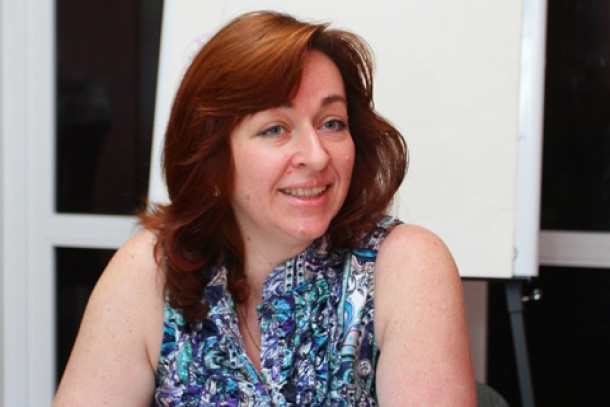10.10.2013 | Insight

Rossibbalt Ltd’s head office in Znamensk (formerly Welau) in the vicinity of Kaliningrad is appealing and tastefully appointed. No wonder, as the company specialises in furniture design. One must practice what one preaches.
It is the stylish concepts and interior designs that Rossibbalt’s employees earn their living on. The company manufactures kitchen interiors complete with cabinetry, drawers, shelving, table tops, kitchen sinks and the rest. Recently, Rossibbalt extended its product range to cupboards designed for use in bedrooms and living rooms.
We have three price categories so that customers can combine modules and put together the kitchen interior according to their individual preferences and cash situation,” says Financial Director Zhanna Povarova. Raw materials for Rossibbalt’s cupboards and cabinets come mostly from Germany and Poland. The actual woodworking and design is carried out at the factory where the plywood and wood panels are transformed into cleanlined, trendy cabinetry.
“At the moment sales are briskest in Moscow. Our most expensive kitchen cabinetry is selling like hotcakes in the capital,” says Director of Commerce Irina Shaposhnikova with a wide grin. Last year, Rossibbalt generated a turnover of RUB 90 million. About 20 per cent of the products are sold in the Kaliningrad region while the rest of the business is generated in other parts of Russia. A total of 15 wholesalers carry Rossibbalt’s products for customers keen to renovate. Most customers want a kitchen in the low or medium price range. The most affordable kitchen costs RUB 20,000 while a high-end interior can set you back RUB 160,000.
Currently, the most popular kitchen colours in Russia seem to be cappuccino and glossy shades of red. Company designers frequently talk to the employees to test what design and colour schemes generate the greatest interest. “Microwave ovens have not struck root in Russia in the same way as in the West. A lot of people continue to cook soups and stews with great dedication spending hour after hour in the kitchen. Healthy low-fat food is also fashionable. Whatever you make, it’s certainly nicer to do your cooking in a fresh and newly renovated kitchen,” says Shaposhnikova disarmingly.
Last year, Rossibbalt decided to replace the company’s diesel-driven boilers with a single 350 kW biofuel-fired boiler. Fuel is readily available as the manufacture of cabinets and furniture generates around 3 to 4 cubic metres of timber waste per day. Previously, waste wood was dumped in the local landfill, but now unusable cabinet parts are incinerated to produce energy for heating the factory buildings. NEFCO financed the project with a loan from its Facility for Cleaner Production.
“We have a silo with a capacity of around 40 cubic metres of biomass. As the system is completely automated, I don’t need to spend as much time maintaining the boiler than in the past,” says Chief Power Engineer Sergey Korobov. The investment in the new boiler will help Rossibbalt save RUB 1.1 million per year and the annual electricity consumption is expected to fall by around 3,200 kWh.
As a result of the project, Rossibbalt has been able to reduce its sulphur, nitrogen oxide, soot and carbon dioxide emissions. As part of the project, the production lines will be upgraded by installing Italian technology in order to increase output and facilitate the cutting of the wood and plywood panels needed for the cabinets and cupboards. At the same time, the factory’s air cleaner and gluing machine will be replaced with new units. “These investments will reduce electricity consumption by about 20 per cent, which will improve profits and cash flow,” concludes Povarova.